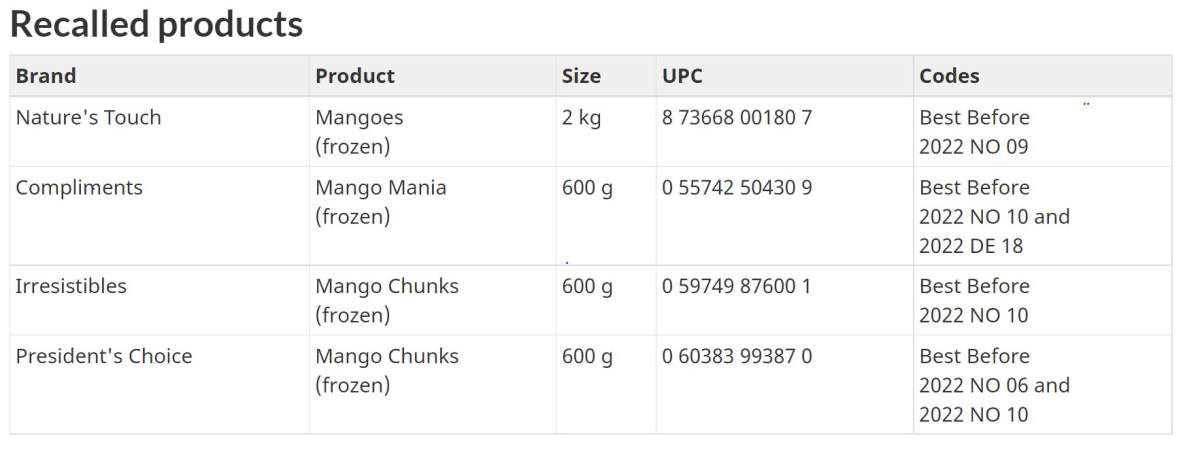Various brands of frozen mangos are being recalled, as the Public Health Agency of Canada (PHAC) investigates an ongoing outbreak of Hepatitis A infections in Nova Scotia and Quebec.

On Friday, the Canadian Food Inspection Agency (CFIA) announced that frozen mangos sold under the Nature’s Touch, Compliments, Irresistibles and President’s Choice brands were affected by the recall.
The move was triggered by an investigation by various federal and provincial health agencies.
According the PHAC, the outbreak is considered ongoing because “recent illnesses continue to be reported.” In addition to Nova Scotia and Quebec, the products were also sold in New Brunswick, Ontario, Saskatchewan, and Manitoba.
As of Saturday, two laboratory-confirmed cases of Hepatitis A are being investigated in Quebec, and one case in Nova Scotia. The people were between the ages of 23 and 63, and became sick in late March to mid-June of this year.
“Based on the investigation findings to date, exposure to frozen mangoes has been identified as a likely source of the outbreak,” the PHAC said in a news release.

Get weekly health news
“Two of the individuals who became sick reported consuming frozen mangoes before their illnesses occurred. Leftover frozen mangoes were collected from the homes of ill individuals and tested positive for Hepatitis A.”
No one was hospitalized and there have been no deaths linked to this recall.
“The CFIA is continuing its food safety investigation, which may lead to the recall of other products. If other high-risk products are recalled, the CFIA will notify the public through updated food recall warnings,” the agency notes.
“It is possible that more recent illnesses may be reported in the outbreak because there is a period of time between when a person becomes ill and when the illness is reported to public health officials. For this outbreak, the illness reporting period is between two and six weeks.”
Hepatitis A infections can happen in people of all ages, but severity tends to increase with age. Those with underlying liver disease are also at an increased risk for severe illness.
Symptoms include fever, dark urine, loss of appetite, nausea, cramps and jaundice. These symptoms typically appear 14 to 28 days after exposure, but they can show up as far out as 50 days later.
Symptoms usually last “less than two months,” says the PHAC.

Anyone who has the recalled mango products should not eat them. The products can be thrown out or returned to the store where they were bought. The mangos should be sealed in a plastic bag, and people should wash their hands with soapy water and sanitize any surfaces after handling them.
As well, it’s recommended people who are ordering mango products at restaurants should ask staff whether the fruit are part of the recall.
Those who suspect they were exposed to a recalled product, or have symptoms of Hepatitis A, should see a health-care provider “immediately,” PHAC says.
“Vaccination can prevent the onset of symptoms if given within 14 days of exposure,” the agency notes.





Comments
Want to discuss? Please read our Commenting Policy first.